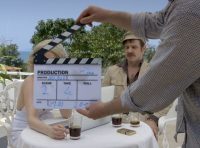
Newsletter June 2017

The anniversaries of Rainer Werner Fassbinder’s birth (31 May) and death (10 June) have just passed once again. And although this is not a major anniversary year, we are nevertheless being constantly reminded of Fassbinder– not only in terms of looking back on his achievements but also because there are so many artists now working who can be characterized as kindred spirits or who have been directly influenced by him.
One current example is the stage production “Fassbinder, Faust and the Animists”, co-funded by the RWFF, in which the Belgian performer and choreographer Michael Laub explores BEWARE OF A HOLY WHORE, contrasting it with Goethe’s “Faust” and elements of animism. As the program for the production puts it, “In large group scenes and solos that flash up like portraits, what is presumably disparate orbits around the central questions of the film and of Goethe’s classic: the relation of the individual to the group, the dynamics of community formation and the partly tragicomic search for meaningful insights in a secularized society.” Performances are on 28 and 30 June and on 1 and 2 July at Berlin’s Hebbel am Ufer (HAU) theater (tickets are available at: http://english.hebbel-am-ufer.de/programme/schedule/laub-remote-fassbinder/). The production is also being staged on 14, 16 and 17 July at the ImPulsTanz festival in Vienna (tickets: https://www.impulstanz.com/en/performances/2017/id1121/).
American Todd Haynes is a director who for many years has regularly made references in his films to the history of cinema in general and Fassbinder’s work in particular. He has just presented his latest film, WONDERSTRUCK, in competition at Cannes, a work in which he again plays cleverly with film references and the aesthetic of past epochs. The film, based on the eponymous book for young people by Brian Selznick, tells the story of two deaf children living in different decades who are mysteriously linked with one another. Haynes directs his adaptation in some parts like a silent film and in others reveals his narrative cosmos using dolls and miniature models as a construct. The fact that this is a strategy located within a particular film-historical tradition is illuminated by an excerpt from Johannes Binotto’s text “Mit doppeltem Boden – Fassbinders Happy Ends und Hollywoods Hoffnung” (False floor – Fassbinder’s happy ends and Hollywood’s hope)”
“As American film-maker Todd Haynes recently emphasized in an interview, Fassbinder obviously did not believe that the truth could be simply expressed within the artificiality of the medium of film. On the contrary, film can hardly avoid falsifying and inevitably straying from the facts. And film is all the more honest when it reveals this inherent, necessary artificiality.” (The entire text is available at: https://www.etk-muenchen.de/search/Details.aspx?ISBN=9783869164366) Although WONDERSTRUCK does function on the meta-level, it also triumphs as a melodrama. The Amazon-produced film is set to open in European and American cinemas at the end of the year.
This year the Munich International Film Festival, which takes place from 22 June to 6 July, features a series of films by Reinhard Hauff. The German director began his career working with popular television formats and went on to produce socially critical works that made him one of the better known representatives of New German Film. Along with films like KNIFE IN THE HEAD, DIE VERROHUNG DES FRANZ BLUM (The canalization of Franz Blum) and STAMMHEIM – for which he was awarded the Berlin Film Festival’s Golden Bear in 1986 – the retrospective in Munich also includes MATHIAS KNEISSL. Based on the true story of the Bavarian robber who took on the state authorities, Hauff’s interest lies above all in the extent to which the title character, who came from an impoverished background, is shaped by external circumstances. The cast reads like a Fassbinder class reunion: RWF himself, Hanna Schygulla, Irm Hermann and Kurt Raab all appear in the film, while Peer Raben contributed the musical soundtrack and Barbara Baum the costumes. The film is being screened on 28 June at 8 p.m. at the Munich Film Museum. Tickets are available from 12 June at: http://www.filmfest-muenchen.de/en/programm/filme/film/?id=5317
Finally, we would like to recommend an exhibition taking place in Venice. Parallel to the art biennale, the Fondazione Prada is showing a collective multimedia work by director Alexander Kluge, photographer Thomas Demand and stage-designer Anna Viebrock. At the center of the show is the motif of a shipwreck. Writing about the exhibition in the German weekly “Die Zeit,” Michael Diers comments, “Almost without noticing, members of the public are transformed into moviegoers, into museum visitors or readers, into people who encounter one another in corridors, people coming and going in quick succession, wandering together past display windows, sitting on circus drums, standing in front of a no-tell motel or a closed bar, or standing on a small stage in order to watch a film interview with Helge Schneider as a terrorist leader.” One of Kluge’s films, which is also being shown at the venue, is titled A MESSAGE FROM AN UNPUBLISHED SCENE IN A FILM BY R.W. FASSBINDER and based in an interview that Fassbinder conducted with a worker. The exhibition “The Boat is Leaking. The Captain Lied.” runs until 26 November. For more information see: http://www.fondazioneprada.org/project/the-boat-is-leaking-the-captain-lied/?lang=en
We wish our readers and friends an inspiring June and will return next month with more news from the world of Rainer Werner Fassbinder.
Photo right: Scene from “Fassbinder, Faust and the Animists” © Martin Langer
Photo left: Juliane Moore in Todd Haynes’ WONDERSTRUCK © Amazon Studios